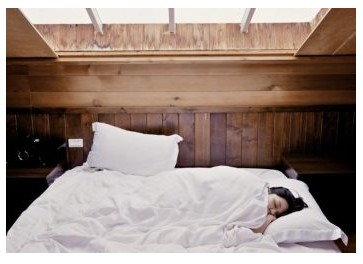How to Improve Your Sleep: Cultivating specific habits, such as maintaining a regular routine and minimizing exposure to blue light before sleep, can enhance your sleep hygiene and facilitate restful sleep.
Have you ever found yourself lying in bed, gazing at the ceiling, and wondering if you’ll ever drift off into a peaceful slumber? Perhaps you wake up thinking it’s time to start your day, but it turns out to be 2 a.m.?.
If you’re struggling with sleep, it might be worth examining your sleep hygiene and considering how your habits could be hindering your ability to get the restful sleep you require.
Let’s delve into the concept of sleep hygiene and the adjustments you can make to your daily routines and bedtime rituals to enhance the quality of your sleep.
What is sleep hygiene?
Sleep hygiene encompasses practices that promote healthy sleep patterns, ensuring you achieve a restful night’s sleep.
Maintaining good sleep hygiene is essential because of how vital it is for your mental and physical well-being, as well as your overall quality of life.
Your actions throughout the day, not just before you retire for the night, can impact the quality of your sleep.
This can include:
Dietary Decisions.
Schedule:
Evening regimen.
If you struggle with sleep, there are several actions you can take, both during the day and before bedtime, to enhance the quality of your sleep.
Let’s delve into 12 strategies to enhance your sleep hygiene and achieve better sleep.
1. Keep a consistent sleep schedule
Aim to establish a consistent sleep schedule, going to bed and waking up at approximately the same times each day, even on weekends. This reinforces your body’s internal clock, which can make it easier for you to fall asleep and wake up at the same time every day.
Maintaining a regular routine can also aid in minimizing daytime sleepiness.
Ensure that the bedtime you choose allows you to obtain 7– 8 hours of sleep each night.
2. Create a relaxing bedtime routine — and stick with it
a calming bedtime ordinary allows you unwind so that you’re ready to sleep. keeping the routine consistent allows your frame recognize that it’s bedtime whilst you begin the habitual. this can help you nod off greater speedy.
The first-class time to start your recurring is ready 30– 60 mins before you go to bed.
Your ordinary can consist of some thing makes you feel most cozy unless it involves a tool that emits blue mild. here are a few thoughts:
Take a heat bathtub or bathe. not most effective is the water relaxing in the second, however the drop for your
frame temperature as you quiet down afterward can also make you experience sleepy.
attempt a few mild stretches or yoga to assist your muscles relax and release anxiety.
Spend a couple of minutes meditating to assist calm your frame and mind.
try listening to some soothing song even as you attention for your breathing.
Spend time reading a ebook, but try to avoid electronic analyzing devices that emit blue mild.
keep away from whatever demanding or overly stimulating, like emotional conversations or working.
3. Turn off electronic devices before you go to sleep
digital devices like your phone emit blue light, that can lessen melatonin ranges for your body. It’s much like how seeing daylight can make you experience extra awake.
Melatonin is a chemical that controls your sleep/wake cycle. whilst your degrees dip, it could be greater tough to doze off.
gadgets that emit blue mild can also keep your mind alert, making it harder to nod off.
preserving your phone near your bed can disrupt your sleep, even if you’re no longer aware about it. Message notifications, humming, and light that may suddenly pop on in the middle of the night can interrupt your sleep.
4. Exercise regularly
as low as 30 minutes of cardio exercise according to day can improve your sleep nice and standard health. workout out of doors may boom the advantages even greater in view that exposure to natural light enables alter your sleep cycle.
If you could’t get out of doors, don’t fear. regular indoor exercising can also assist you sleep better.
however avoid exercise within an hour or of your bedtime. this may boom your strength degrees and frame temperature, which may also make it harder to doze off.
if you need to perform a little form of interest later within the day, strive doing stretches or yoga.
5. Limit your caffeine intake
The results of caffeine can final three–7 hoursTrusted supply when you eat it. which means that your afternoon cup of coffee may keep you conscious and alert loads longer than you’d like.
although it’s normally excellent to restrict your caffeine intake to the morning hours, keep in thoughts that everybody has a exceptional tolerance to caffeine.
some people may be able to stretch their consumption to midafternoon, even as others would possibly need to cut themselves off an awful lot earlier so one can fall asleep without difficulty.
The much less caffeine you consume, the extra touchy you will be to its results.
6. Make your sleep environment work for you
The way you set up your sleep surroundings may assist you doze off and stay asleep more without difficulty.
For the general public, a bedroom temperature between 60 and 67°F (15.6 and 19.four°C) is the superior temperature for snoozing.
It’s additionally important to make certain you have got a comfy mattress, pillows, and bed linens. The greater secure you’re, the easier it can be to fall asleep and live asleep. want hints? Browse our marketplace, packed with editor-depended on and expert-validated pillow and mattress suggestions.
in case you’re a mild sleeper or have noisy associates, a very good pair of earplugs or a white noise device may also assist you sleep without disruption.
additionally, if your bedroom gets flooded with an excessive amount of light, you can want to recollect the usage of blackout curtains or an eye fixed mask to keep your sleep environment as darkish as viable.
7. Go to bed only when you’re tired
in case you’re now not tired, keep away from lying in bed while you toss and turn. as a substitute, try doing a chilled pastime until you start to feel worn-out, then head to bed.
if you don’t fall asleep inside 20 mins of going to bed, arise. now not being able to fall asleep can also purpose you to grow to be pissed off or stressed, which could preserve you wakeful even longer.
after you get off the bed, do some thing that will help you unwind, like reading at the sofa or stretching until you’re tired sufficient to go again to bed.
8. Limi. t napping — or avoid it if you can
sound asleep throughout the day can make it tougher to go to sleep later and might make you greater at risk of waking up during the night time.
in case you do want to nap:
maintain it to 20 mins or lessTrusted supply.
avoid sleeping later in the afternoon.
snoozing can also have an effect on the sleep sample of older adults more than younger human beings, however the quantity of that is nevertheless uncertain.
9. Manage stress before going to bed
thinking about stuff you’re worried about can keep you unsleeping at night. To assist save you your concerns from retaining you conscious:
Write down your issues earlier than going to mattress to help get them out of your head.
if your to-do list stresses you out, write that down as properly. Prioritize what you want to do tomorrow and the
rest of the week, then try to loosen up.
studies indicates that a weighted blanket may also assist with anxiety and insomnia, and it is able to provide advantages much like deep strain remedy.
strive meditation before mattress to assist calm your thoughts.
10. Limit large meals before bed
consuming a massive meal earlier than mattress may additionally negatively affectTrusted source your sleep great. it may also motive symptoms of acid reflux, that may maintain you wakeful.
ExpertsTrusted source additionally advocate heading off alcohol and nicotine, particularly earlier than mattress, as they are able to worsen your sleep pleasant.
11. Manage your light exposure
Spending time in herbal mild can help control your circadian rhythm. ExpertsTrusted supply propose getting sunlight exposure in the morning and during the day
if feasible proscribing light publicity after sunset may also assist benefit your sleep and aid the production of hormones and chemical compounds vital for sleep. you can do that through:
the usage of heat-light spectrum lightbulbs in the rooms you spend time in earlier than mattress
turning off more lights within the hours before mattress dimming lighting fixtures some hours earlier than mattress if feasible
setting your electronic devices to go into “night” mode after sunset, which reduces blue light publicity
if you’re a shift worker, you can take one of a kind steps to manage mild exposure and aid sleep.
The bottom line
Sleep hygiene is ready having healthy sleep habits. Your behaviors, both throughout the day and around bedtime, can affect the first-rate of your sleep.
when you have a difficult time falling or staying asleep, you could try several strategies to fall asleep quicker — and live dozing for hours at a time. maximum of those involve enhancing your sleep hygiene.
Sticking to a schedule, having a relaxing bedtime routine, exercising frequently, keeping your bedroom darkish and at a comfortable temperature, and looking what you consume and drink can all impact the quality of your sleep.
if you continue to have issues along with your sleep styles or insomnia, make certain to comply with up with your health practitioner. they are able to decide whether or not an underlying circumstance is causing your sleep problems and might provide the treatment you may need.
FAQ:
How Do I Improve My Sleep Naturally?
To improve your sleep naturally, focus on building healthy sleep habits known as sleep hygiene. Here are some effective, natural ways to sleep better:
- Stick to a consistent sleep schedule – Go to bed and wake up at the same time every day.
- Create a relaxing bedtime routine – Wind down with calming activities like reading or meditation.
- Limit screen time before bed – Blue light from devices can disrupt melatonin production.
- Keep your bedroom cool, dark, and quiet – A sleep-friendly environment promotes deeper rest.
- Avoid caffeine and heavy meals before bed – These can interfere with falling and staying asleep.
- Get regular exercise – Physical activity helps regulate your sleep cycle (just avoid intense workouts right before bed).
- Try natural sleep aids – Herbal teas like chamomile or supplements like magnesium may help.
Improving sleep naturally involves small, consistent lifestyle changes that support your body’s natural rhythms.
What Is the 10-3-2-1 Rule for Sleep?
The 10-3-2-1 rule for sleep is a simple bedtime routine formula designed to improve sleep quality by managing your habits leading up to bedtime:
- 10 hours before bed: Avoid caffeine to allow your body to fully eliminate its stimulating effects.
- 3 hours before bed: Stop eating and drinking alcohol to support digestion and prevent sleep disturbances.
- 2 hours before bed: Finish all work-related tasks to help your mind start winding down.
- 1 hour before bed: Turn off all screens (TV, phone, computer) to reduce blue light exposure and encourage melatonin production.
Following the 10-3-2-1 sleep rule helps train your body for restful, uninterrupted sleep by creating a consistent and calming pre-bed routine.
What Is the 10-4-3-2-1 Rule for Sleep?
The 10-4-3-2-1 rule is a sleep hygiene strategy that outlines a step-by-step approach to prepare your body and mind for restful sleep:
- 10 hours before bed: Cut off all caffeine to prevent it from interfering with your natural sleep cycle.
- 4 hours before bed: Stop consuming alcohol, as it can disrupt deep sleep and cause nighttime awakenings.
- 3 hours before bed: Avoid heavy meals or intense exercise, giving your body time to digest and unwind.
- 2 hours before bed: Wrap up work and mentally disconnect from stress or screen time related to productivity.
- 1 hour before bed: Turn off all screens to reduce blue light exposure, which can block melatonin production and delay sleep.
By following the 10-4-3-2-1 sleep rule, you create a consistent evening routine that promotes deeper, more restorative sleep—naturally and effectively.
How to Improve Your Sleep: 10 Natural Tips to Fall Asleep Quickly
If you’re struggling to fall asleep, here are effective, science-backed ways to get sleepy fast—naturally and without medication:
- Lower the lights – Dim lighting signals your brain to produce melatonin, the sleep hormone.
- Avoid screens – Turn off phones, tablets, and TVs at least 30–60 minutes before bed to reduce blue light exposure.
- Try deep breathing or meditation – Calms your nervous system and prepares your body for sleep.
- Take a warm shower or bath – The drop in body temperature afterward can trigger drowsiness.
- Use relaxing scents – Lavender or chamomile essential oils can promote sleepiness.
- Stick to a routine – Going to bed and waking up at the same time helps regulate your internal clock.
- Read a physical book – Reading something light (not on a screen) can relax your mind.
- Listen to calming music or white noise – Soothing sounds can help slow your brainwaves.
- Avoid caffeine in the evening – Even afternoon coffee can delay sleep.
- Keep your bedroom cool and dark – Ideal sleep temperature is around 60–67°F (16–19°C).
Using these natural tips consistently can help you get sleepy faster and improve your overall sleep quality.
Is 6 Hours of Sleep Enough?
For most adults, 6 hours of sleep is not enough. According to the CDC and sleep experts, the recommended amount of sleep for adults is 7 to 9 hours per night. Consistently getting only 6 hours can lead to:
- Decreased focus and productivity
- Weakened immune function
- Higher risk of heart disease, obesity, and diabetes
- Mood swings and increased stress levels
While some people believe they can function well on 6 hours, studies show that sleep deprivation builds up over time, even if you’re not immediately aware of it. Prioritizing 7–9 hours of quality sleep is essential for optimal health, energy, and mental clarity.



